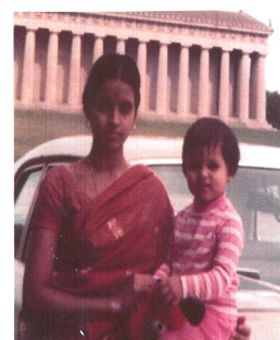 Photo on right: Deepa with her mother in Nashville, Tennessee, circa 1975
Photo on right: Deepa with her mother in Nashville, Tennessee, circa 1975
As an immigrant, a South Asian American, and a mother, the current debate over immigration policy is deeply personal to me. At the time my parents moved from India to spend a year in Nashville, Tennessee, I was two and a half, around the same age as my own son is now. As I navigate life with a toddler, I often reflect on the experiences that my mother had when she became a new immigrant in the United States. It is hard for me to imagine the isolation that she must have felt in a new country, not yet “home.” In India, my mother had worked, had driven me around, and had enjoyed being with her friends and family. In the U.S, she was cut off, trying to navigate a culture, language, and systems that seemed foreign and overwhelming.
My mom’s experiences as an immigrant mother in the United States are not unique. Those of us with immigrant mothers find that the stories that have been handed down to us have a similar cadence - of struggle and stress, but also of resilience and strength. But, what is troubling to me is that in my work at South Asian Americans Leading Together (SAALT), I often hear stories that don’t sound markedly different from the stories of women who immigrated in the 1970s and 1980s -- despite the changes in laws and perceptions of immigrants over the past forty years. In some cases, the situations facing immigrant women and mothers today are worse due to unfair immigration policies that prevent women from leading full lives in the United States.
Take Meghna Damani, for example, who had been on an H-4 dependent visa for years. Current law does not allow dependent spouses to work in the United States. In her documentary, Hearts Suspended, Meghna reveals how the dreams and hopes of women who are unable to use their education and skills in the United States have been shattered, sending many into isolation and depression. Women on dependent visas who are abused by their partners have even more limited options under the immigration system, making it harder for them to leave their abusive partners. Immigration reform must ensure that women who immigrate to the U.S. on dependent visas have options to utilize their skills and background to make intellectual and economic contributions.
The story of Kabita, a Bangladeshi immigrant and advocate, is one of family separation. In this clip from SAALT’s Say It Loud! documentation series, Kabita describes her feelings of being separated from her daughter: “We are just crying over the telephone all through, because we want to be together. We want to help each other in family and social life, but I am deprived from all these things.” Sadly, instead of improving such a situation, today’s debate over immigration would actually place more limitations on some family members (including adult married children and siblings) from reuniting with their loved ones.
Or, take the story of Pema, a Nepali nail salon worker, who turned to one of SAALT’s local partners, Adhikaar, after enduring harsh workplace conditions. Immigrant women in the informal sector and in service and retail industries, many of whom are undocumented, are especially vulnerable to exploitation. Immigration reform must ensure that the rights of workers are preserved and strengthened, and that the path to legalization does not require stringent evidentiary requirements to show proof of employment.
And, while South Asian men, especially since 9/11, have been targets for detention and deportation, it is often women who bear the brunt of harsh immigration enforcement policies that separate families from one another. The documentary, Whose Children Are These?, chronicles the story of Navila Ali, whose father was subjected to detention through the National Security Entry/Exit Registration Program (NSEERS), which required men from certain Middle Eastern and South Asian countries to submit to questioning by immigration authorities in the wake of 9/11. With her father in detention, it is Navila’s mother who became the family’s support system.
As Congress considers landmark immigration reform legislation, now is the time to better understand the consequences of flawed immigration policy on women, and to enact appropriate changes. While the bill that passed through the Senate Judiciary Committee in late May contains a number of provisions that would be beneficial to immigrant women, there are still important fixes to be made in the areas of immigration enforcement, worker rights, merit-based systems that prioritize education and employment skills, and family unification.
Throughout our history, immigrant women have borne the often untold consequences of unjust immigration laws. With the opportunity to pass a landmark immigration reform law, we must ensure that the unique experiences, contributions and hopes of immigrant women are recognized and addressed. We owe our immigrant mothers nothing less.


The views and opinions expressed in this post are those of the author(s) and do not necessarily reflect those of MomsRising.org.
MomsRising.org strongly encourages our readers to post comments in response to blog posts. We value diversity of opinions and perspectives. Our goals for this space are to be educational, thought-provoking, and respectful. So we actively moderate comments and we reserve the right to edit or remove comments that undermine these goals. Thanks!